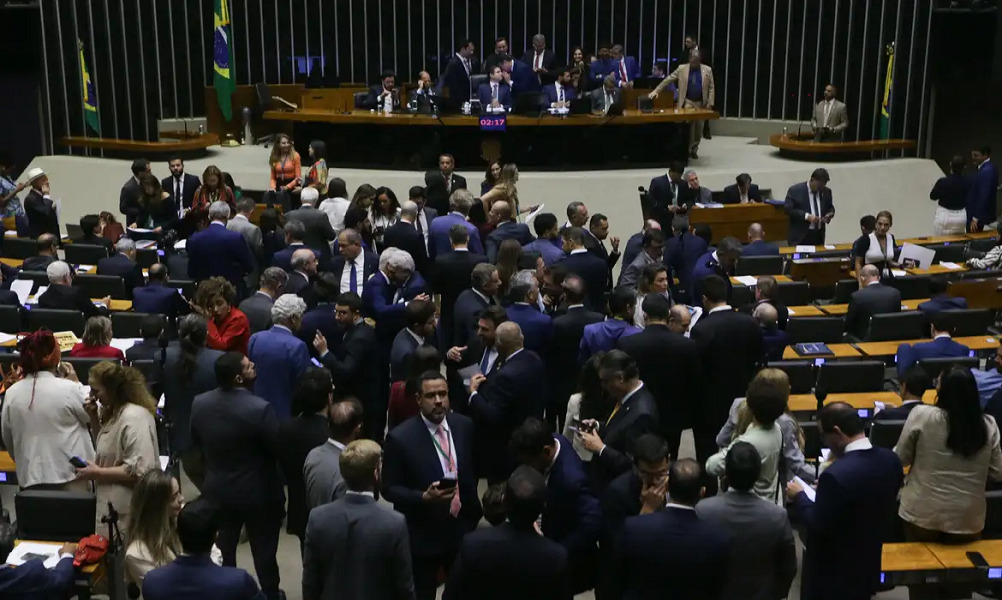Brazil’s political and economic landscape is entering a phase of recalibration marked by legislative momentum, shifting alliances, and preparations for the 2026 elections. In Congress, President Lula’s income tax reform signals an effort to strengthen purchasing power and popular approval, while the government simultaneously updates its communication strategy to expand digital outreach. Speaker Hugo Motta’s intensified use of expedited voting procedures highlights Congress’s growing influence over the national agenda. Meanwhile, centrist parties consolidate power across states, the opposition seeks to ease tensions with the Supreme Court, and ministers such as André Fufuca face rising pressure within their own ranks, revealing the complex balance between governance, politics, and institutional stability.
This Content Is Only For Subscribers
To unlock this content, subscribe to INTERLIRA Reports.
Income Tax Exemption
On Wednesday (01/10), the Chamber of Deputies approved a bill proposed by President Lula granting an income tax exemption for individuals earning up to R$5,000 per month. The measure, seen as one of the government’s most popular initiatives, passed unanimously following strategic coordination by former Speaker Arthur Lira (PP). Fast-tracked under an urgent procedure, the bill now awaits Senate approval before presidential sanction. To offset expected revenue losses, higher-income taxpayers will face adjusted rates. The proposal is part of Lula’s broader tax justice narrative, intended to reduce inequality and stimulate consumption among lower- and middle-income workers.
New Strategy
With the 2026 elections approaching, the Lula administration has revamped its communications approach, focusing on digital engagement and online visibility. The Secretariat of Social Communication (Secom) now allocates 30% of its advertising budget to digital platforms, compared to 20% last year. According to Minister Sidônio Palmeira, the campaign emphasizes sovereignty, social inclusion, and tax fairness, aiming to shape public perception across digital ecosystems. This marks a departure from former minister Paulo Pimenta’s emphasis on radio, which prioritized outreach to rural and low-income audiences. The shift reflects a strategy to appeal to younger voters and counter disinformation through broader online presence.
Urgent Procedure
The legislative fast-tracking mechanism popularized by Arthur Lira (PP) continues under Speaker Hugo Motta (Republicans), allowing bills to bypass committee deliberation and proceed directly to plenary voting. According to data from O Globo, the number of bills approved under this format has risen sixfold since Motta assumed office—from 5 in February to 29 in September—totaling 105 urgent motions in 2025. After public backlash over the “Shielding Amendment” (PEC da Blindagem), which sought to expand parliamentary protections, Motta turned his focus to security-related measures. Eight such bills were grouped for expedited voting, expected to define the legislative agenda in the coming weeks.
Centrão
As the Workers’ Party (PT) and Liberal Party (PL) concentrate on the 2026 presidential race and Senate expansion, centrist blocs such as PP, União Brasil, and Republicans have seized the opportunity to strengthen their foothold in state politics. These parties are preparing an unprecedented number of gubernatorial candidates, leveraging their expanded congressional representation and access to substantial party and electoral funds. The rise of the Centrão signals a recalibration of Brazil’s power map, with these pragmatic coalitions consolidating influence in both legislative negotiations and regional administrations.
Easing Tensions
While Federal Deputy Eduardo Bolsonaro (PL) and commentator Paulo Figueiredo continue lobbying in the United States for sanctions against Brazilian officials, Bolsonaro’s domestic allies are quietly signaling an intention to de-escalate conflicts with the judiciary. Intermediaries close to the former president have approached Supreme Court justices seeking a “gesture of pacification” that could help suspend ongoing investigations tied to the January 8 coup attempt. The outreach reflects a tactical retreat aimed at reducing judicial friction and rebuilding political viability for the Bolsonaro camp ahead of future elections.
Ministry of Sports
Facing mounting pressure from his own party, Minister of Sports André Fufuca (PP) will accompany President Lula (PT) to an event in Imperatriz, Maranhão, on Monday (06/10), in a show of defiance toward party leadership. PP President Ciro Nogueira had ordered all party members to resign from government posts by Sunday (05/10), threatening to strip Fufuca of his state party command if he refused. Despite the ultimatum, Fufuca chose to maintain his ministerial agenda alongside Lula, signaling loyalty to the administration and resistance to Nogueira’s directive.
Analysis:
Brazil’s political environment is defined by a balance between governance, institutional coordination, and electoral strategy. President Lula’s proposal to exempt individuals earning up to R$5,000 from income tax functions as both social policy and political maneuver, reinforcing his “tax justice” narrative and strengthening popular appeal ahead of 2026.
The government is also reshaping its communication strategy, increasing Secom’s digital spending to expand online outreach and target younger voters. By highlighting themes like sovereignty and inclusion, the administration seeks to counter the right’s dominance on social media and regain narrative control.
Meanwhile, Speaker Hugo Motta’s use of expedited voting demonstrates Congress’s growing assertiveness, while the Centrão consolidates influence as a key electoral force. As Bolsonaro’s allies seek to ease tensions with the judiciary, Brazil’s stability depends on pragmatic coalitions rather than ideological confrontation.
Source: G1, O Globo [1] [2] [3] [4], Folha de S. Paulo [1] [2]




